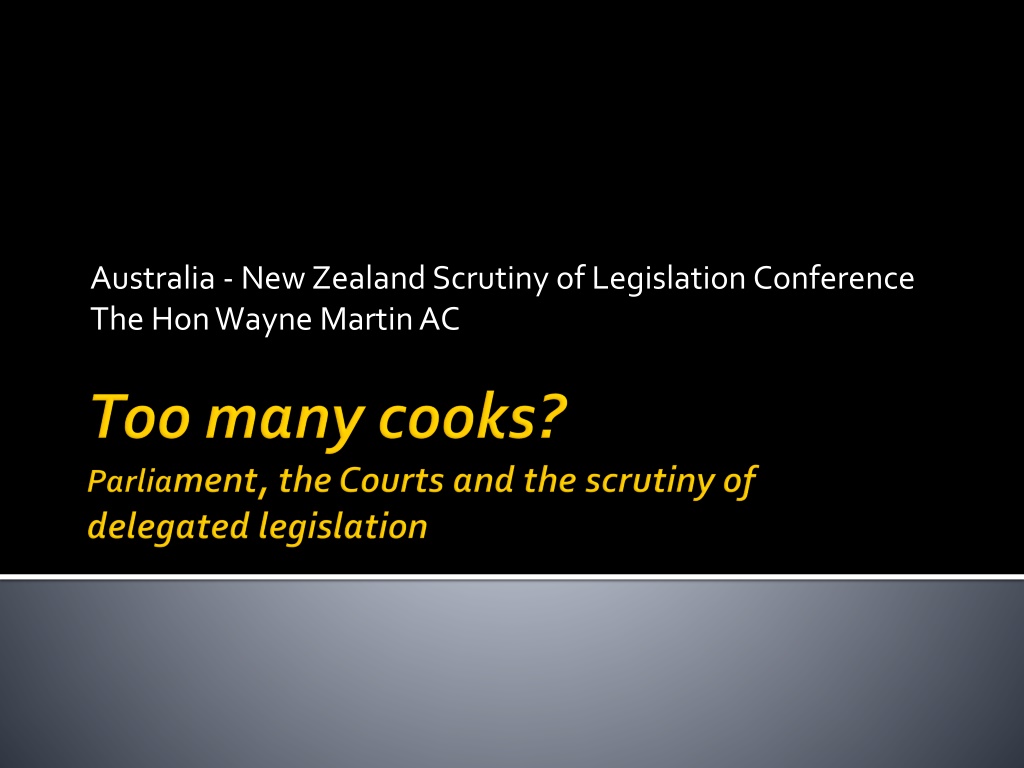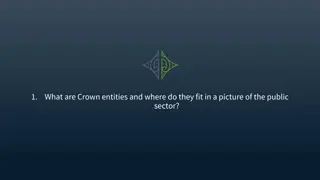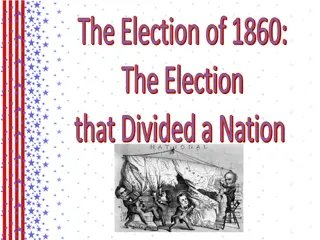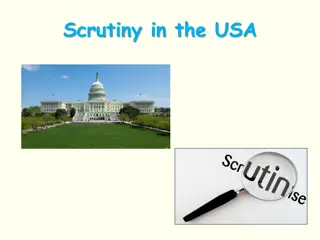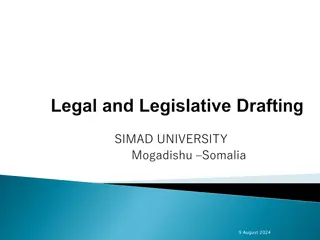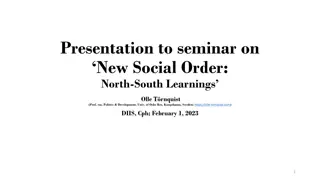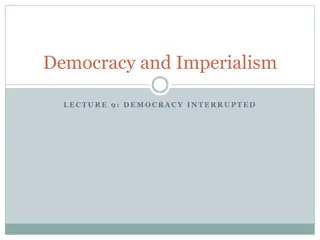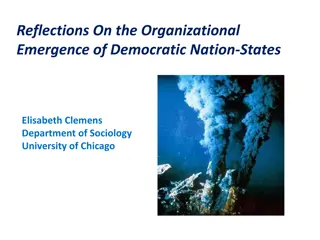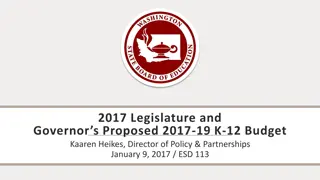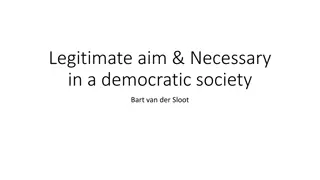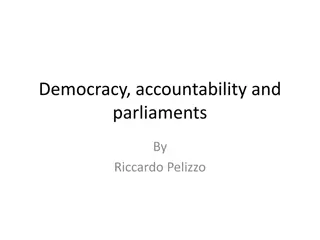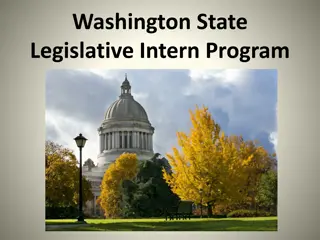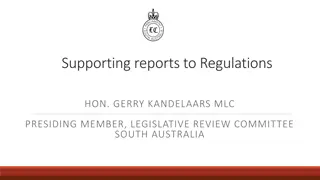Challenges in Legislative Scrutiny and Democratic Accountability
The Australia-New Zealand Scrutiny of Legislation Conference delves into the issue of an increasing number of laws being made by the executive branch rather than by Parliament, raising concerns about democratic accountability. Historical examples, such as Henry VIII's Statute of Proclamations, highlight the evolution of executive powers. Efforts to review legislation, preserve human rights, and prevent unchecked executive authority are discussed, emphasizing the importance of maintaining a balance of power. Lessons from Western Australia serve as a cautionary tale in navigating these challenges.
Download Presentation

Please find below an Image/Link to download the presentation.
The content on the website is provided AS IS for your information and personal use only. It may not be sold, licensed, or shared on other websites without obtaining consent from the author. Download presentation by click this link. If you encounter any issues during the download, it is possible that the publisher has removed the file from their server.
E N D
Presentation Transcript
Australia -New Zealand Scrutiny of Legislation Conference The Hon Wayne Martin AC
Many more laws are now made by the executive branch of government under powers delegated by the Parliament than are made by the Parliament itself The magnitude and scope of the laws made by officials who are neither chosen by nor responsible to any electorate raises issues with respect to the erosion of democratic accountability
An early example of the conferral of power upon the executive was in 1385 Henry VIII sStatute of Proclamationsof 1539 empowered the King, with the advice of his Council, to: set forth Proclamations under such Penalties and Pains as to him and them shall seem necessary, which shall be observed as though they were made by Act of Parliament
The new despotism, which is yet to be defeated, gives Parliament an anaesthetic. The strategy is different, but the goal is the same. It is to subordinate Parliament, to evade the Courts, and to render the will, or the caprice, of the Executive unfettered and supreme. Rt Hon Lord Hewart of Bury, the Lord Chief Justice of England (1929)
Standing committees charged with the responsibility of reviewing delegated legislation including standing committees charged with the responsibility of reviewing legislation from the perspective of the preservation of human rights Publication of instruments in a public register
Automatic repeal of legislation by "sunset" clauses Limiting the incorporation of other instruments or writings into the instrument Preventing the remaking of legislative instruments which are "the same in substance" to those disallowed within six months of disallowance
Power of the Legislative Council to enact laws enabling representative government in WA was conferred by an Imperial Act -the Australian Constitutions Act 1850 (Imp) It was exercised by the Constitution Act 1889 (WA) The 1889 Act was ratified by the Imperial Parliament at Westminster, as the First Schedule to an imperial statute, the Western Australia Constitution Act 1890(Imp)
Section 73 of the WA Constitution 1889: gave power to alter or repeal any of the provisions of the Act but subject to a manner and form requirement requiring an absolute majority of the members of each House; required that any bill which "shall interfere with the operation of" certain specified sections of the Act "shall be reserved by the Governor for the signification of Her Majesty's pleasure thereon"
The Imperial Act of 1890 preserved the application of certain manner and form provisions in other Imperial Acts to amendments to the 1889 Act including: section 33 of the Australian Constitutions Act 1842 (Imp) which provided that any Act reserved "for the signification of Her Majesty's pleasure thereon" required public notification of the Royal Assent in the colony within two years
One of our first duties is to protect to the utmost of our power the aboriginal races Barron H De Worms, Under Secretary of the State for the Colonies (1890) Section 70 of the 1889 Act was one of the provisions in respect of which any Bill which "shall interfere" with its operation had to be reserved by the Governor for the signification of Her Majesty's pleasure
In 1891 Sir John Forrest requested the Secretary of State to agree to the repeal of section 70 In 1892 legislation was introduced into the WA Legislative Assembly to repeal section 70 and it was enacted in 1894 That Act lapsed because Royal Assent had not been notified within two years after presentation of the Bill to the Governor of the Colony
A 1897 Bill for the repeal of section 70 was passed, received the assent of the Governor, transmitted to Whitehall and purportedly proclaimed into effect on 28March 1898 As a result of the efforts of Mr F Lyon Weiss , in 1905 the Secretary of State for the Colonies advised that it had not been validly proclaimed in accordance with Imperial legislation
The WA Parliament quickly passed the Aborigines Act 1905which, by section 65, again attempted to repeal section 70 of the 1889 Constitution Act and, on this occasion, to deem it to have been repealed from 1 April 1898
Eighty-eight years later, in 1993, proceedings were commenced in the WA Supreme Court challenging the repeal of section 70 Hurdles facing the plaintiffs included: A limitation period of 6 years after the 1905 Act was proclaimed No standing to sue
The High Court unanimously concluded that by 1905 there was no longer any legislative requirement that the Act repealing section 70 be tabled in the Houses of the Parliament at Westminster
Kirby J observed that the significance of the 1905 Act: might well have justified not only scrutiny by officials of the Executive Government of the United Kingdom but also an opportunity for scrutiny by both Houses of the Imperial Parliament. Attention to the Bill in those Houses in 1905 might have enlivened a more sensitive defence of the Imperial interest in protecting indigenous peoples in Western Australia. But it might not. Yougarla v Western Australia [2001] HCA 47, [130]
A deplorable history 1911: extended the Chief Protector of Aborigines legal guardianship to every "aboriginal and half caste child" to the exclusion of the rights of the mother of an illegitimate half-caste child" 1941:restricted the right of Aboriginal people to move from north to south of the 20thparallel of latitude 1944: enabled Aboriginal people to acquire "citizenship" and "be deemed to no longer be a native or aborigine" by renouncing all ties to extended family and Aboriginal friends and their Aboriginal culture 1960: enacted legislation referring to quadroons
Constitution Amendment (Recognition of Aboriginal People) Act 2015(WA) Noongar (Koorah, Nitja, Boordahwan) (Past, Present, Future) Recognition Act 2016 (WA)
The Imperial Parliament did not consider or review the actions of the WA Parliament on any of the three occasions upon which that Parliament purported to repeal section 70 The proposition that the WA Parliament was the most reliable protector of the indigenous inhabitants of this State is impossible to reconcile with: subsequent legislation authorising dispossession, discrimination and the forceful removal of Aboriginal children from their families Aboriginal inhabitants of this State being disenfranchised and unable to vote until 1962
Mechanisms for review cannot depend upon form and technicality if they are to be effective The efficacy of mechanisms for review depend upon the commitment, vigour and determination of those empowered to undertake the review The importance of public scrutiny of the delegated legislative process
The procedural obstacles placed in the path of those who sought to challenge the validity of the 1905 Act in the courts illustrate other significant inhibitions upon the efficacy of the judicial review of delegated legislation as a mechanism for scrutiny.
There are not too many cooks and those that are in the kitchen must be well resourced and assiduous if we are to minimise the erosion in democratic accountability which accompanies the exponential growth of delegated legislation
